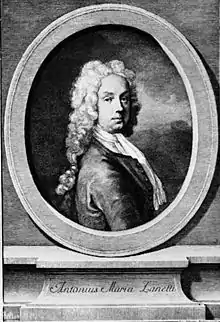Antonio Maria Zanetti
Count Anton[io] Maria Zanetti (1689–1767)[1] was a Venetian artist, engraver, art critic, art dealer[2] and connoisseur. He formed a collection of engraved gems, of which he published a lavish catalogue.
Antonio Maria Zanetti | |
|---|---|
 | |
| Born | 20 February 1680 Venice, Republic of Venice |
| Died | 31 December 1767 Venice, Republic of Venice |
| Occupation | Artist, critic, collector, copperplate engraver, xylographer |
Life
Zanetti spent his early manhood making wise investments in marine insurance, accumulating sufficient capital to support his true vocation, as a writer and artist, and as an art dealer, doing much of his business with the English aristocrats who passed through Venice on the Grand Tour.[3] He acted as paintings agent for Philippe d'Orléans in forming the Orléans collection, Paris, and Joseph Wenzel I, Prince of Liechtenstein, in expanding the Liechtenstein collection, Vienna. Pierre Crozat, being in Venice in 1715, persuaded Zanetti and his protégé Rosalba Carriera to go to Paris. Zanetti also visited London, where he purchased Jan Petersen Zoomer's three large volumes containing 428 Rembrandt etchings in outstanding impressions of the various states.[4]
He formed a collection of engraved gems, both Greco-Roman and modern,[5] of which he published a lavish catalogue, in the form of A.F. Gori's Le gemme antiche di Anton Maria Zanetti (1750), illustrated with eighty plates of engravings from his own drawings. The drawings for the engravings, and many of his intaglios and cameos, are conserved in the Museo Correr, Venice. His prize piece, a black cameo of Hadrian's favourite, Antinous, which he had pursued for years before acquiring it,[6] was bought by George Spencer, 4th Duke of Marlborough and gained the sobriquet of the "Marlborough gem".
As a printmaker, Zanetti advanced the art of the Chiaroscuro woodcut, producing many prints after paintings by Parmigianino, Tintoretto and others.
Further reading
- The modern monograph on the two Zanettis is Fabio Borroni, I Due Anton Maria Zanetti (Florence, 1956).
- Venetian prints and books in the age of Tiepolo. New York: The Metropolitan Museum of Art. 1997.
- Michael Matile, Della Grafica Veneziana: Das Zeitalter Anton Maria Zanettis (1680-1767) (Petersberg, 2016).
- Bozena Anna Kowalczyk, 'Anton Maria Zanetti the Elder and His Time', Print Quarterly, Vol.XXXV No.1 March 2018, pp. 98-101.
Notes
- Diana Scarisbrick, "A. M. Zanetti and the Althorp Leopard," Apollo 110 (1979:425-27)
- Zanetti, Della pittura veneziana e delle opere pubbliche de veneziani maestri gives a view of contemporary Venetian painting; it continued to be expanded and reprinted decades after his death. Diana Scarisbrick, "A. M. Zanetti and the Althorp leopard," Apollo 110 (1979:425-27) gives the bibliography of Zanetti's publications.
- His correspondence with Henry Howard, 4th Earl of Carlisle is published by Diana Scarisbrick, "Gem Connoisseurship - The 4th Earl of Carlisle's Correspondence with Francesco de Ficoroni and Antonion Maria Zanetti", The Burlington Magazine 129No. 1007 (February 1987:90-104).
- Ferdinando Salamon, The History of Prints and Printmaking from Dürer to Picasso, 1972:216.
- Diana Scarisbrick, "Piranesi and the 'Dactyliotheca Zanettiana'" The Burlington Magazine, 1990.
- "Le fameux amateur, et un peu marchand d’antiques à Venise, Antonio Maria Zanetti – je ne sçais s’il vit encore – fit une fois vingt-trois ans l’amour à un Antinoüs (une antique dont il fit l’acquisition), qu’il épousa enfin. Il auroit, disoit-il, vendu sa maison pour l’acheter, s’il eût été parfait." (Pierre Clément, 1756, quoted in Antinous website)
External links
- Lucchese, Enrico (2020). "ZANETTI, Anton Maria". Dizionario Biografico degli Italiani, Volume 100: Vittorio Emanuele I–Zurlo (in Italian). Rome: Istituto dell'Enciclopedia Italiana. ISBN 978-8-81200032-6.